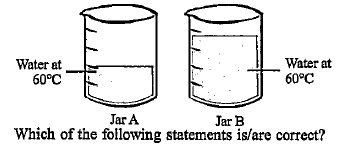Given are responses of 7-8 years old children after they have observed an experiment done by the teacher, in which water in a bowl is heated and it has evaporated:
"Water has disappeared.”
“The bowl has absorbed the water.”
“The fire drank the water."
“God drank the water."
How should the teacher deal with these responses?
Show the standard water cycle chart.
Give the definition of evaporation and ask the children to memorize it.
Initiate a discussion to revisit their ideas.
Tell the children that they are wrong
The correct Answer is:C
Step by step video, text & image solution for Given are responses of 7-8 years old children after they have observed an experiment done by the teacher, in which water in a bowl is heated and it has evaporated: "Water has disappeared.” “The bowl has absorbed the water.” “The fire drank the water." “God drank the water." How should the teacher deal with these responses? by Environmental Studies experts to help you in doubts & scoring excellent marks in Class 14 exams.
Updated on:21/07/2023Similar Questions
Look at the given jars-A and B. Both jars are of same size and are made of glass.

I. The water in both Jars are of the same temperature. II. The water in Jar A has less heat than the water in Jar B. III. The water in Jar B has less heat than the water in Jar A IV. The water in both Jars have the same amount of heat.
View SolutionIt has been observed that 8 to 10 days after the rains, the level of water in a well rises. Which type of soil would allow rainwater to reach the well faster and in greater amount ? Give reason for your choice.
View Solution
Knowledge Check
Given are responses of 7-8 years old children after they have observed an experiment done by the teacher, in which water in a bowl is heated and it has evaporated:
"Water has disappeared.”
“The bowl has absorbed the water.”
“The fire drank the water."
“God drank the water."
What do these responses tell us about children and their thinking?AChildren have alternate ideas about evaporationBChildren's responses are illogicalCChildren's thinking is incorrectDChildren cannot make a good observationGiven are responses of 7-8 years old children after they have observed an experiment done by the teacher, in which water in a bowl is heated and it has evaporated:
"Water has disappeared.”
“The bowl has absorbed the water.”
“The fire drank the water."
“God drank the water."
Which of the following is an example of a question assessing divergent thinking of children on the topic, 'evaporation'?AWrite five advantages of water cycleBWhat will happen if there is no water cycle?CList the steps in sequence of water cycleDDraw and label water cycleA five year old child is trying to fill a container with water using a cup although it result in more water spilled on ground rather filling it the container how should the teacher solve this problem?
Ateacher should find out other ways so that children can to fill the container easilyBteacher should tell the child to hold the container tightly and pour water in itCby demonstrating the whole process of filling up container itselfDby watching the child while doing activity and asking what is happening at each step
A water tank at a school has 2423 litres of water. After the lunch times,it is observed that the water level has come down to 12 litre. How much water did the students use?
View SolutionDuring exercise, a person may give offf 180 kcal of heat in 30 min by evaporation of water from the skin. How much water has been lost? Given that latent heat of vaporization of water is 540 cal/gm.
View SolutionAnswer question numbers (a), (d) on the basis of your understanding of the following paragraph and related studied concepts.
Copper sulphate crystals which seem to be dry contain water of crystallisation. When we heat the crystals, this water is removed and the salt turns white. If you moisten the crystals again with water, you will find that blue colour of the crystals reappears. Water of crystallisation that is the fixed number of water molecules present in one formula unit of a salt. Five water molecules are present in one formula unit of copper sulphate. Chemical formula for hydrated copper sulphate is CusO4.5H2O. Now you would be able to answer the question whether the molecule of Na2CO3.10H2O is wet. One other salt, which possesses water of crystallisation is gypsum. It has two water molecules as water of crystallisation. It has the chemical formula CaSO4.2H2O
Explain how plaster of Paris helps in keeping fractured bones in the right position
View SolutionAfter its old exoskeleton has been shed but before the new one has hardened, an aquatic arthropod absorbs water and swells. How is this behaviour adaptive?
View SolutionDev is a 12-year-old, studying in 6th class, and has a younger brother Surya whose age is 7-years. Surya is playing by dipping balls in water tub. Dev observed that the level of the water increases when Surya starts dipping the balls one after the other in the water. Then Dev remembered his 6th class topic measurement of volume. He poured water up to the brim of the tub and set up another bigger tub at the bottom of the first tub. He then asked his brother Surya to dip ten identical balls in it so that the overflowed water is collected in the tub at the bottom. Dev calculated volume of overflowed water and found that it was 2 litres. Dev calculated volume of each ball. Which of the following options matches with Dev's calculations?
View Solution
